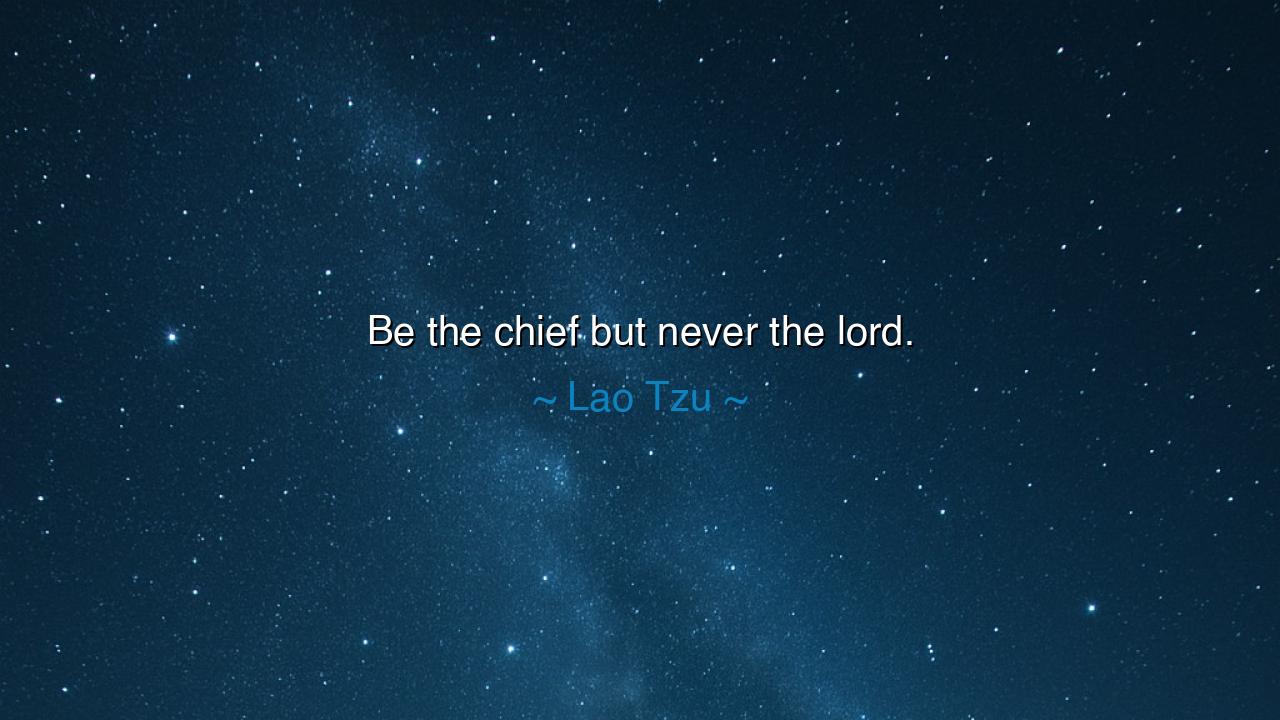
Be the chief but never the lord.






Hear, O children of the Way, the ancient voice of Lao Tzu, master of the Tao, who whispered through the ages: “Be the chief but never the lord.” These words are not mere counsel on governance but a revelation of the deeper nature of true leadership. For there is a vast gulf between the chief who guides and serves, and the lord who rules with dominion and pride. One leads in harmony, the other enslaves with power; one nurtures, the other consumes.
To be the chief is to stand at the front, not as a tyrant but as a guide. The chief is the one who carries the burdens of others, who sets the example, who points the way by walking it first. The chief does not seek glory for himself but works for the good of the people. His power lies not in commands, but in trust; not in fear, but in respect. A chief is one with the tribe, bound by the same hunger, the same cold, the same dangers.
But to be the lord is different. The lord stands apart, claiming ownership of men and their labor. He demands loyalty without offering service, obedience without compassion. The lord builds walls of pride between himself and his people, and in doing so, he loses their hearts. He may command their bodies, but he cannot command their spirits. His leadership is an illusion sustained only by fear, and fear, like dry grass, burns quickly into rebellion.
Consider the story of George Washington, first leader of the United States. He was offered kingship, the chance to be lord over a new land, yet he refused. He chose instead to be a chief among citizens, bound to the same laws and duties as those he served. His greatness was not in crowns or titles, but in restraint, humility, and devotion to freedom. Because he was chief and not lord, a republic was born, and his name endures in honor.
Or think of Ashoka the Great of India. In his youth, he sought to be lord, conquering lands in blood and fire. But after the slaughter of Kalinga, his heart was pierced with sorrow. He turned from lordship to chiefship, embracing the way of Dharma, ruling with compassion, justice, and service. His empire flourished, not because of fear, but because of the trust and devotion he inspired. His choice to be chief and not lord became the light of a civilization.
The meaning of Lao Tzu’s wisdom is this: true leadership is not about domination but about harmony. To be chief is to stand with your people, guiding them gently, living their struggles, sharing their victories. To be lord is to stand above them, demanding service while giving little in return. One path builds unity, the other breeds division. One endures, the other crumbles.
The lesson, O listeners, is clear: in your families, your work, your communities, choose to be chief, not lord. Guide by example, not by command. Serve those you lead, rather than seeking to be served. Earn loyalty through humility, not fear. For respect given freely is stronger than obedience forced.
Therefore, let your practice be this: walk with the people you lead, not above them. Share in their burdens, listen to their voices, and lead them not with pride but with humility. For as Lao Tzu has spoken, “Be the chief but never the lord.” In this way, you will not only lead—you will be remembered as one who gave life, harmony, and dignity to all who followed.






AAdministratorAdministrator
Welcome, honored guests. Please leave a comment, we will respond soon